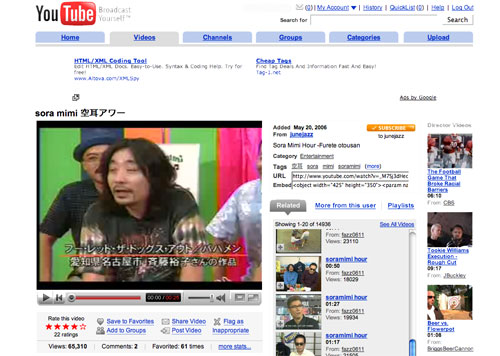YouTube and Japan making slow progress
Copyright holders need to embrace the power of the internet

Round one of the battle between YouTube and the entire Japanese media concluded last week when the video-sharing site agreed to include a Japanese-language warning on its website advising users not to upload copyrighted content, but what does it mean for the future of the Google-owned company?
At a meeting attended by Google's David Eun and YouTube's Chad Hurley and Steven Chen, the Japanese Society for Rights of Authors, Composers and Publishers ( JASRAC ) heard that, in addition to the new warning, YouTube was working on an automated system to scan and identify copyrighted uploads.
Moreover, JASRAC will also have been pleased to learn of the YouTube plan to share revenue with the users who fill its site with videos, as that will force people to register their real personal details - a move that JASRAC asked for in its original December complaint . However, none of the initiatives has been given a firm launch date so far.
The 23 Japanese organisations involved in the dispute represent all of the most powerful media bodies and companies in a country that generates a third of YouTube's global traffic. Previously, the video site had agreed to delete almost 30,000 clips of Japanese television that infringed copyright and unpublicised deletions appear to be happening at an increasing pace.
YouTube playing it careful
Clearly, YouTube has a lot to lose if it goes head to head with vested interests in Japan (we've already seen entire countries block YouTube access ) but the most frustrating aspect of the debate is how woefully ignorant the old-time media players seem to be of what they stand to gain by embracing the internet.
Let's imagine a scenario where they actually learn how to distribute their content digitally in a timely fashion at a reasonable price - it might go a little like this:
Robbie Burns in, say, Scotland has been studying Japanese for a year and hears he might like the excellent Japanese comedy found on Sora Mimi Hour but, no matter how hard he twiddles the knobs on his TV or adjusts his satellite dish he can't find it anywhere. What to do?
Get daily insight, inspiration and deals in your inbox
Sign up for breaking news, reviews, opinion, top tech deals, and more.
Fortunately, the TV station that airs it in Japan has just started selling high-quality full episodes to would-be viewers outside Japan for £1 a time. Accept a version with appropriately localised commercials and the show's free - no need to resort to illegal, low-quality video websites when a sweet deal like that's on the table.
Te result is that our hypothetical viewer gets his show, probably tells a few friends and - if the scenario is repeated around the world as often as the YouTube experience suggests it might be - the program makers add millions to their already-swollen bank accounts.
Sadly, until reality catches up with the media firms involved, that scenario remains but a pipedream. Sure, there are technical issues to sort out, particularly involving copy protection, but there's no reason why a similar model can't work in the near future. Apple's iTunes Music Store has already given us a taster of how to distribute popular TV shows online, so here's hoping.
J Mark Lytle was an International Editor for TechRadar, based out of Tokyo, who now works as a Script Editor, Consultant at NHK, the Japan Broadcasting Corporation. Writer, multi-platform journalist, all-round editorial and PR consultant with many years' experience as a professional writer, their bylines include CNN, Snap Media and IDG.